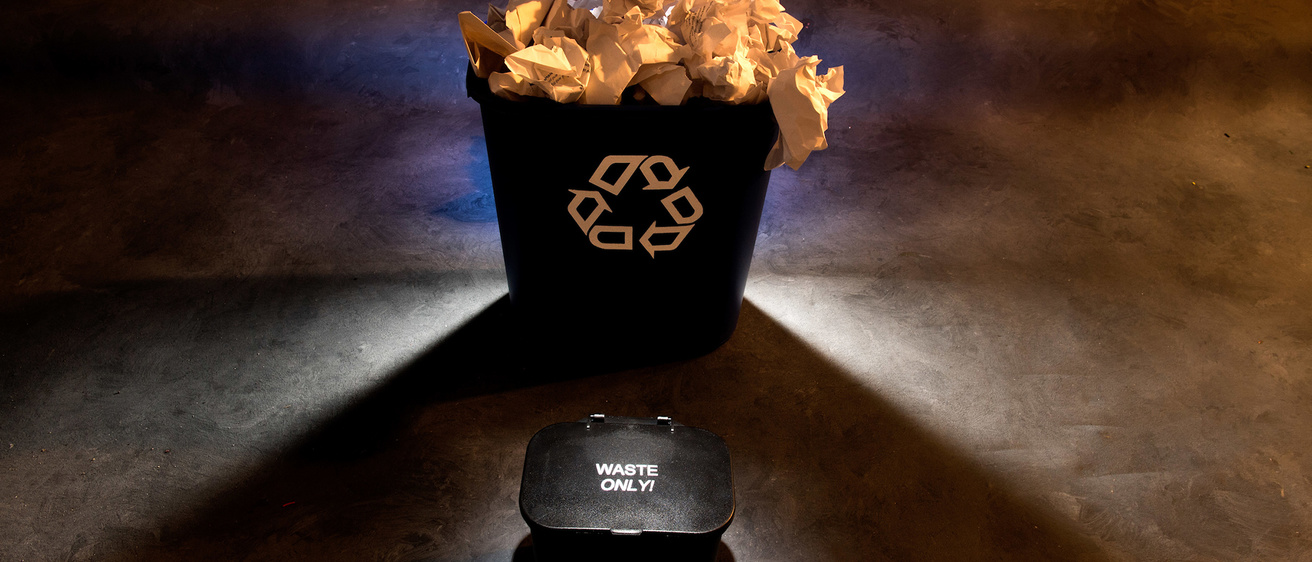Elizabeth Wildenberg de Hernandez describes herself as a “super-crazy recycler.” Yet the associate director of study abroad in International Programs at the University of Iowa was skeptical when she was asked to swap her garbage can for a recycling bin with a much smaller garbage receptacle attached to it.
“I was like, ‘I don’t know how it’s going to work,’” Wildenberg de Hernandez says.
Now she is a big supporter of Tiny Trash, a UI initiative to reduce waste on campus. More than 2,000 faculty and staff in 18 buildings have joined in the effort, which was launched by the UI Office of Sustainability in 2013.
“For me it has been really eye-opening, because I’ve realized how little actual garbage I produce at work,” says Wildenberg de Hernandez, who adds that most of her refuse—banana peels, tissues, and tea bags—is compostable.
Tiny Trash ties into the UI’s goal, announced in 2008 by then-President Sally Mason, to divert 60 percent of campus-generated waste to recycling by the year 2020. The university is pursuing other energy-efficiency and consumption targets, including using less energy in 2020 than 2010 despite projected growth, having 40 percent of its energy come from renewable sources, and reducing the carbon impact of transportation.
“The UI is among universities and businesses across the country using Tiny Trash as a strategy to increase recycling and reduce landfill waste,” says Sara Maples, interim director in the Office of Sustainability. “The program engages faculty, staff, and students who are regularly on campus and plays a significant role in the UI’s waste-diversion goal.”
Tiny Trash is a simple concept: Participants replace their trash bins with blue recycling containers that have a much smaller trash receptacle attached to them. Enrollment in the program is voluntary, and most who adopt the practice decide to continue, says Beth MacKenzie, recycling coordinator in the Office of Sustainability.
The real change comes with how waste and recycling are perceived. After all, the trash can got smaller, and the recycling container got a lot bigger.
“If you have a recycling bin this big,” says MacKenzie, gesturing with her arms to indicate its size, “and Tiny Trash is much smaller, then when your recycling bin is full, you’ll empty it. By making the recycling container bigger and the trash smaller, it changes your behavior.”
MacKenzie cites the UI Center for Disabilities and Development as an example. The center adopted Tiny Trash in May 2017. In the four months before its adoption, the center’s average monthly recycling rate was 26 percent. Since May, the average monthly recycling rate has increased to 46 percent.
The Tiny Trash initiative also saves money. Since International Programs made the switch, its annual order of trash liners dropped from 50 rolls to three, says Mary Paterson, the office’s administrative services manager.
Between 50 and 60 staff, students, volunteers, and interns in International Programs signed up for Tiny Trash when it was introduced in January 2017. Now, 117 have joined.
“Everybody here is really on board with recycling and repurposing,” Paterson says.
The most recent push to expand Tiny Trash was a two-day drive in November at the Pappajohn Business Building, home to the Henry B. Tippie College of Business. One of the first volunteers to pick up a Tiny Trash unit was Jennifer Fuhrman, lecturer and director of Tippie’s undergraduate program in economics. Fuhrman says she believes recycling is the right thing to do—personally and for the UI.
“It really doesn’t take a lot of effort to do this,” Fuhrman says. “And, as a public university, it sets a good example.”
Buildings that have adopted Tiny Trash
- Adler Journalism Building
- Becker Communication Studies Building
- Calvin Hall
- Campus Recreation and Wellness Center
- Center for Disabilities and Development
- College of Nursing Building
- English-Philosophy Building
- Field House
- Housing Administration
- Information Technology Facility
- Iowa Memorial Union
- Jessup Hall
- Macbride Hall
- Pappajohn Business Building
- Seamans Center
- Schaeffer Hall
- University Services Building
- Wendell Johnson Speech and Hearing Center
Source: Office of Sustainability
